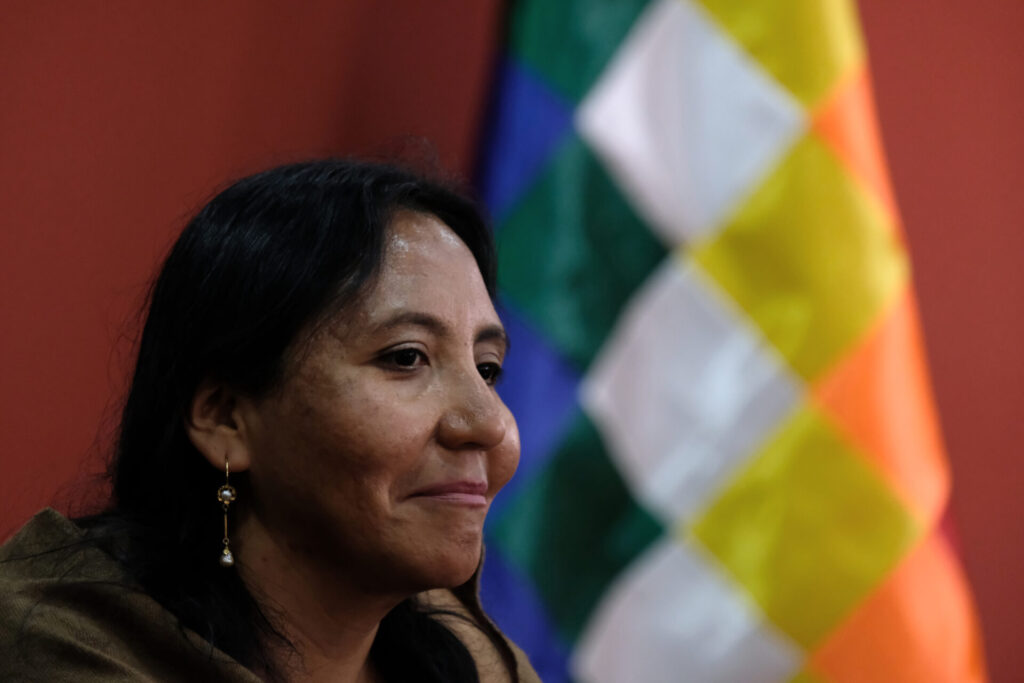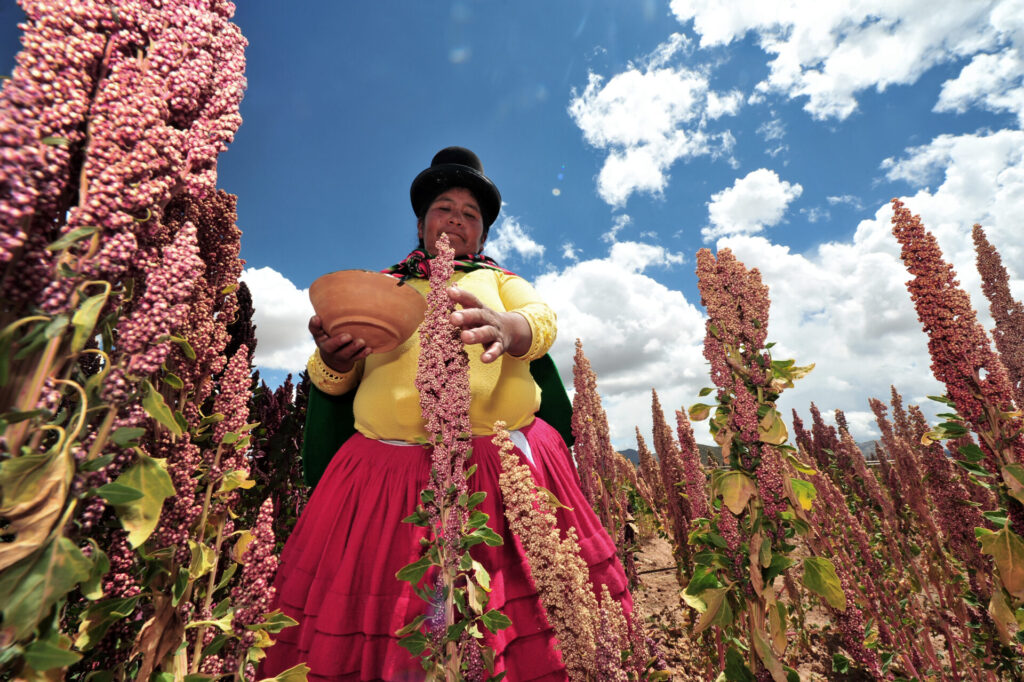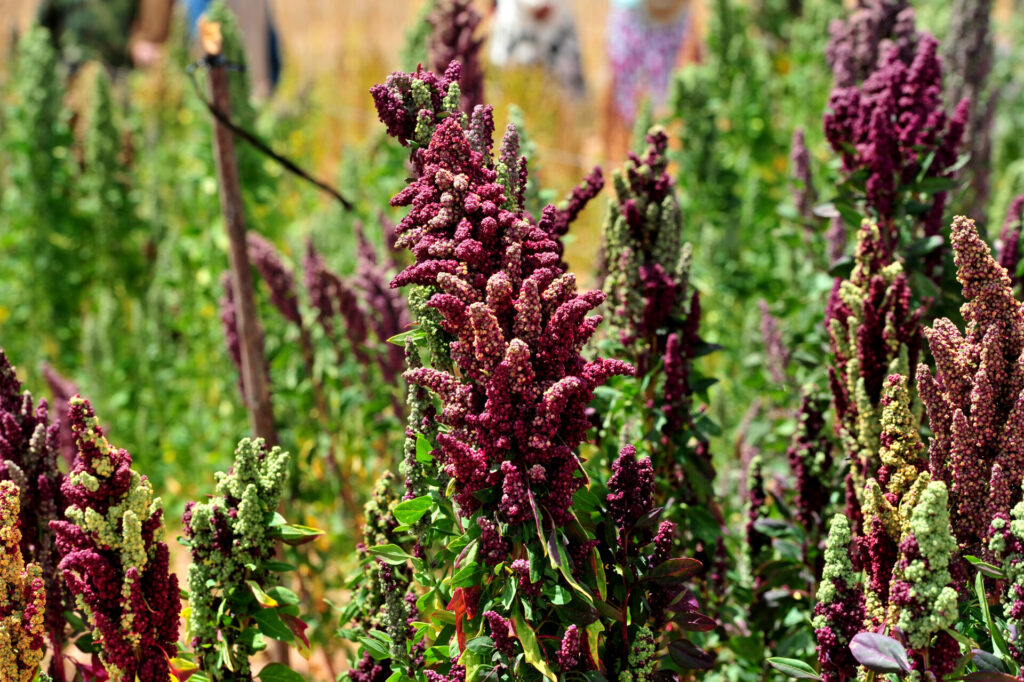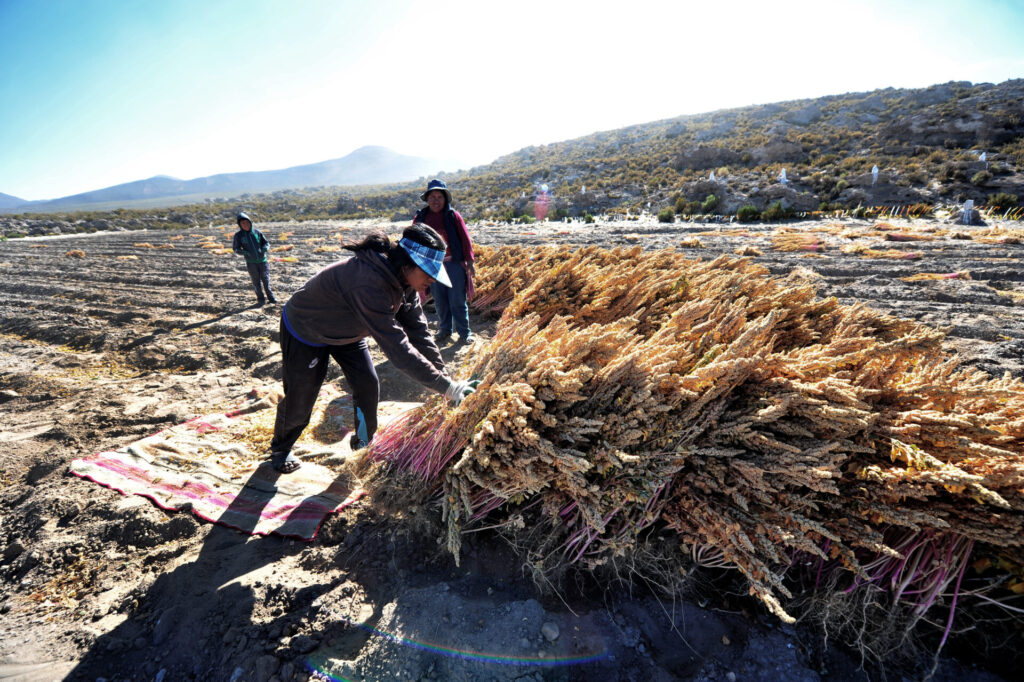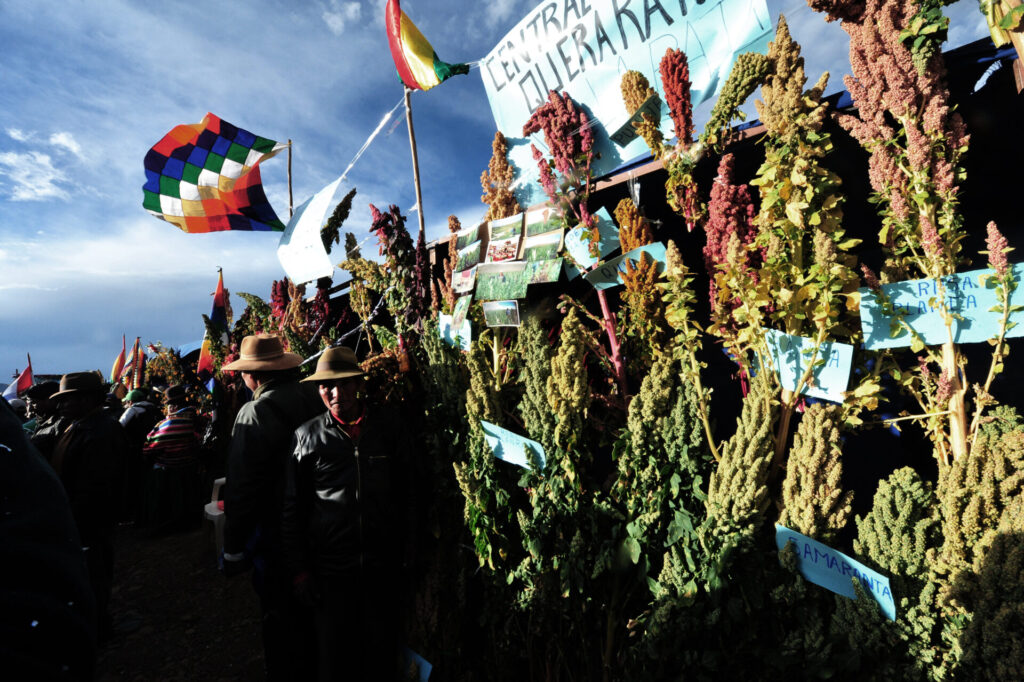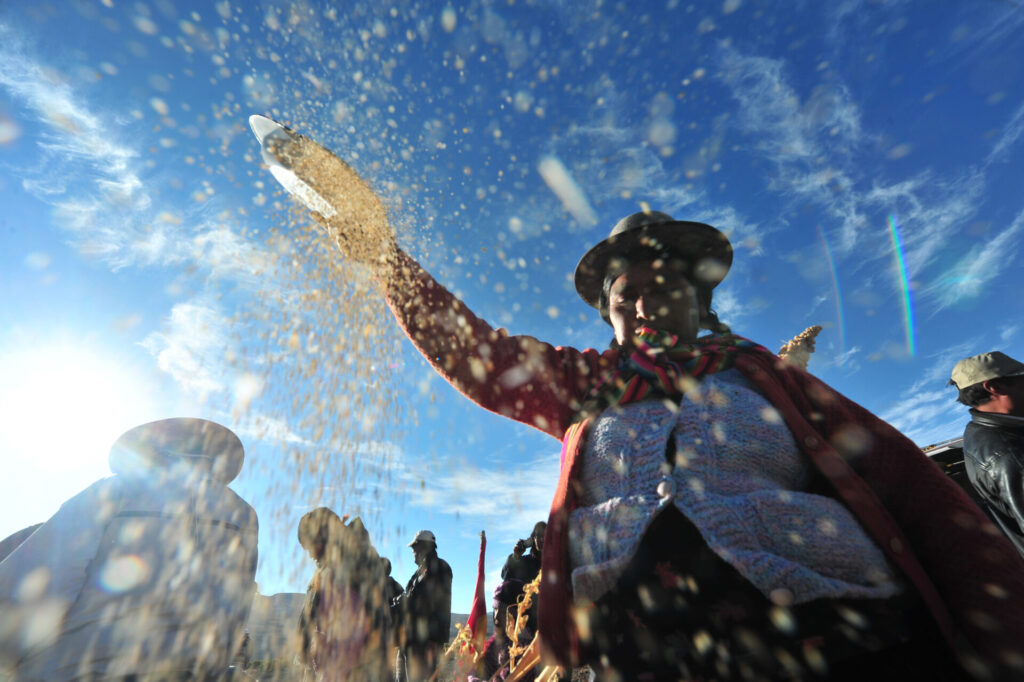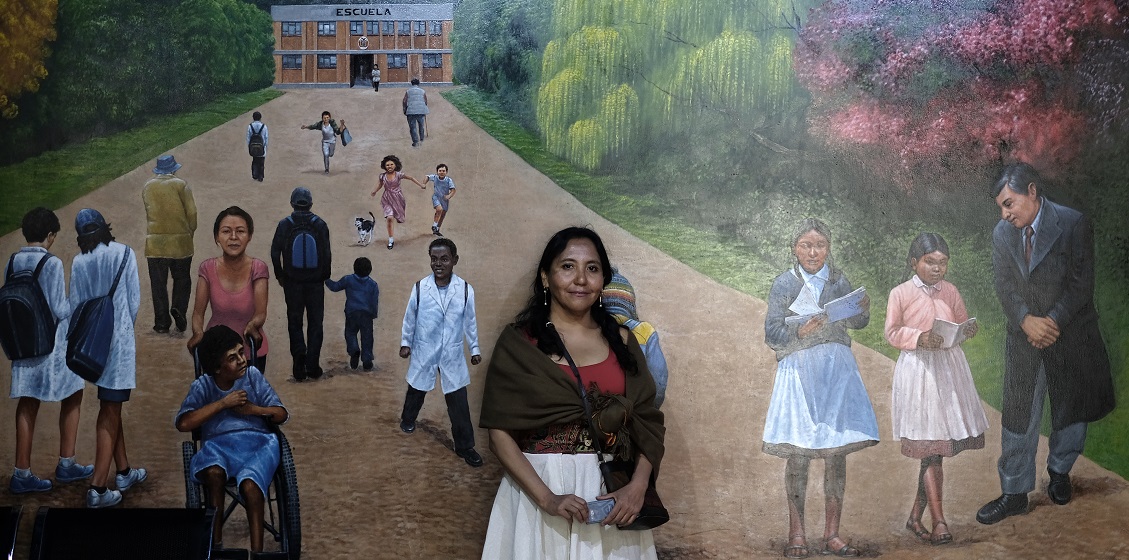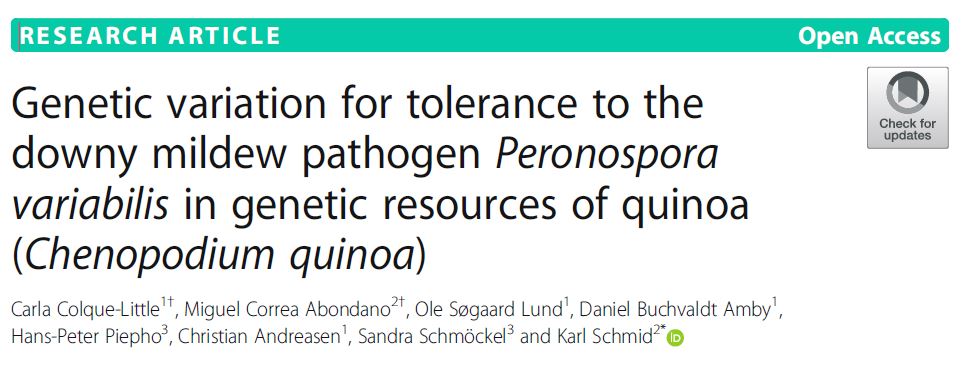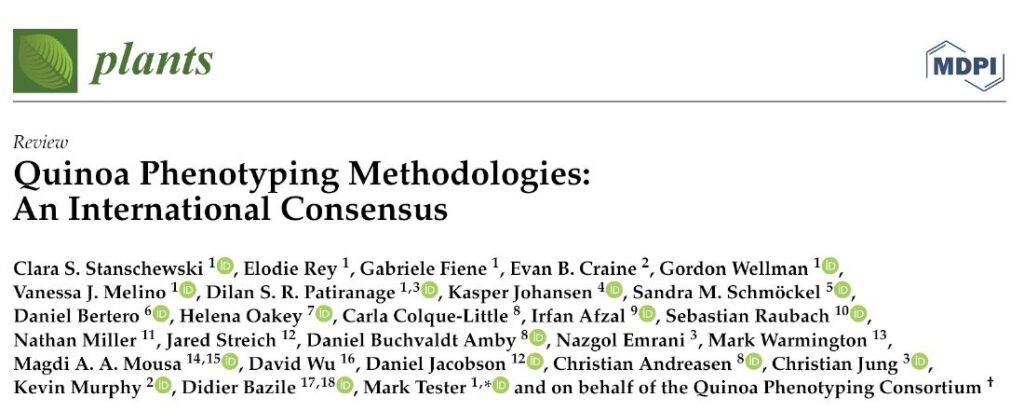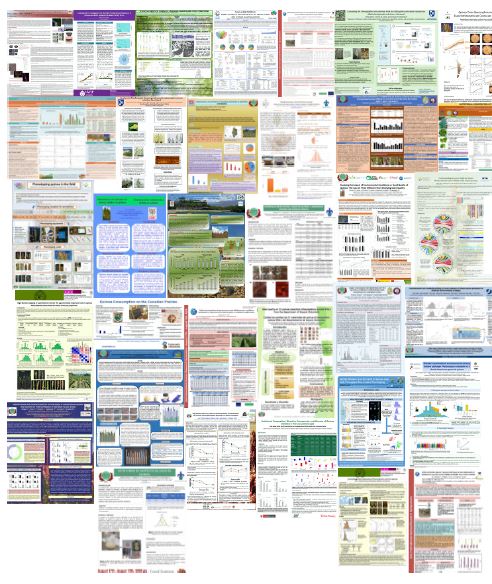Carla Colque-Little specializes in diseases of one of the star crops from Bolivia – quinoa. A plant that many countries – for instance, Denmark – are eager to adapt to cultivate in their farmland – is a crop for the future. But changing the habitat of the quinoa is not without problems. Understanding diseases and plagues is a key to success. And Carla Colque-Little, who did her Ph.D. in Denmark with a scholarship from the Bolivian government, holds important information on that key.
She is dressed in a stylized indigenous skirt and a vicuña wool shawl. Carla Colque-Little recalls how years back she walked around in these same streets of La Paz, the administrative capital of Bolivia, thinking and deciding about the great offer she had got about studying in Denmark. A great step for an Andean woman from Bolivia. “My life changed that day.“ Her face lights up with a big smile when recalling the moment.
But the decision was not easy at all. As a single mother with two children, leaving her country and the rest of her family was an enormous challenge and change. “It has not been without sacrifice,” the Bolivian scientist admits. Also, when she lost her mother while studying abroad that was a tough mark on that road.
Back in 2014, the government of the indigenous president Evo Morales began offering scholarships to 100 people like Carla. Together with Carla, we visit the Ministry of Education in La Paz, where we meet Mario Fuentes Teran, Director of University Education: “With these scholarships, Evo has thought of the Bolivian youth even without having gone to the university. It has been a way of democratizing education in Bolivia to improve development in the country. The initiative is a part of the national policy on science sovereignty,” states Mario Fuentes Teran.
The new government of 2020, led by Luis Arce Catacora, offers 200 scholarships tells the education director. The scholarships will be given in the areas of science, technology, nuclear energy, and health. The deal is that the Government pays for the studies, travel and stay in the host country. In return, the students must work twice as long as they studied – in strategic enterprises back home in Bolivia. It’s the strategic state enterprises – like Lithium Resources, Sugar production, Bolivian Airways, seeds (in the case of Carla), oil – who makes their suggestion to which kinds of specialization is needed for the interests of the Bolivian State.
When the 100-scholarship program was launched, Carla already had a master’s degree from London. She decided to go do her Ph.D. Copenhagen with a scholarship from the Bolivian government: “In Denmark, people didn’t believe me, that coming from a developing country, my government had paid for me to be there. We can now raise our heads. It’s about scientific diplomacy,” says Carla.
She is right now preparing to say goodbye – once again – to her family and country. She returned to Bolivia last year and she managed to negotiate to go back to Denmark; her specialized knowledge about diseases in quinoa is sought after.
While we meet Carla, she shows us around her beloved city La Paz – where she went to school and did her studies at the University. Her connection with her roots and her country is clear and strong. Quinoa is a product of worldwide interest. Carla is a phytopathologist, which means she studies diseases of plants. This research area is about genetic breeding when searching for disease resistance. But it did not have prestige , according to Carla: “The general idea is that you just identify the disease, the insect pest, for instance, you look for a cure – could be chemical – or sometimes it doesn’t impact the yield performance sufficiently to be worried about. And that’s it,” says Carla.
And the same happened in the area of quinoa: “The global interest – outside the Andean countries – was about adapting the quinoa to places with long days – in Europe – Germany, Denmark. And in China, Corea, and Japan to the conditions, they have there”. A great change from the conditions in Bolivia, where there is almost no difference between the time for sunrise and sunset.
And scientists have succeeded in adapting quinoa to these new conditions. “They have made advances – actually they have published about the genes related to the conditions for long days and its chromosomal location. This is a step ahead on making the necessary stable adaptations so that the crop can grow under these conditions”.
But it quickly turned out that it is not that simple just to move a plant from one part of the world to another, a completely different one. This is where Carla and her colleagues’ research comes into the picture: “Thanks to our research we have managed to show that the adaptation, the domestication of the plant, the crop has had a biological penalization. That penalization refers to a loss in beneficial microorganisms, and of greater resilience of the plants towards diseases”.
Basically, the research shows how the quinoa grows well and healthy when it is together with its many organisms in its native environment, explains Carla: “In the original environment of the plant, it is not alone. There is a complex of organisms that lives together with it. We know that in the soil there is a great quantity of bacterizes – other microorganisms that favor the plant. In this symbiosis, the plant is living in balance. But then, when you take this plant and you want to adapt it to other systems – to a completely different place – it’s possible, yes – but there is a biological penalization – it loses a lot of these good microorganisms, which then give more space to those bad ones – the diseases”.
So then, the diseases that earlier were not very important (to study) suddenly get important, tells Carla: “In my thesis, our research has found the scientific evidence for this, and it has important implications because the diseases infect the grain, they produce mycotoxins”. So suddenly the demand for a profile like the one by Carla increased: “The global interest towards quinoa will look for researchers who are up to date on those aspects of the quinoa. And in diseases, there are not a lot of people because that was the least important for a long time”.
When I ask her how she could use what she learned in Denmark, she answered promptly that “it’s rather what I could teach them – about the quinoa which is from my country”. This goes both ways, she insists. “This kind of exchange should always be done like this – both ways. It also increases the possibilities of scientific discoveries. Because researchers in the Andes, are in contact with our intuition, and we can communicate this to the people in Europe. This is really interesting,” Carla points out.
It’s easy to notice how Carla has a different background and cosmovision than that of a typical European scientist. She tries to link intuition – or call it observation – with known or unknown facts, for instance how she dreams of being able to speak with the plants to be able to understand them better. Before leaving for Denmark, she first paid visits to the important places for quinoa to collect information. She went to Puno, close to the Titicaca lake in Peru. She visited Quito, the capital of Ecuador, and many other places in that country. Also, the trip passed Lima, and she visited an experimental station for quinoa in Peru.
Carla expresses herself, her work, and her connection with nature in a way far from the European academic world. “I would like to listen to the plant in its place – it is a living being that I wish I was able to communicate with. That it enriches me and tells me about it. It is the same when I am in the lab, I also wish I could communicate with the organisms – they are alive! They are interacting.” Carla is clearly very excited about this part of her work. She shows a photo of when you look in a microscope at microorganisms. “These things move, they are alive. For me, it doesn’t serve for anything just the letters – without looking at the plants, without feeling them.”
Via the computer screen, Carla proudly shows me the paper of her thesis. It includes Andean symbols such as the Bolivian mountains: Tunupa, Illimani, and Illampu, and then drawings of the quinoa, llamas, and the Bolivian flag. “This work is really important for me and for my government,” says Carla.
The conclusion of her thesis includes how this scientific research and exchange between the Andean Region and Europe is necessary. It enhances the process of discovery that will prevent and reduce infections in European grains and produce food safety. And without this exchange, it’s going to take longer to discover this. On the other hand, from the Bolivian side, they need to improve their performance and good prices and to get acknowledgment of the quinoa with a denomination of the origin. “The fact that I was in Europe with the knowledge about the Andean quinoa, facilitated that we could manage this. Us Andean people know more about quinoa than Europeans”.
And just the detail that Spanish is her mother language makes it possible for her to include other sources, which have enriched the articles and research. On the other hand, it was possible for Carla to get to learn about new technologies and experts in genetic improvement which were only accessible in Europe. She could not have done that if she just stayed in Bolivia. Both in literature and songs, there is this specific term, Lamento Boliviano – meaning Bolivian Sorrow. Something many Bolivians relate to – Carla as well, referring to when Bolivia was colonized by Spain 500 years ago. “We are all illegitimate children here in Bolivia because we are a mix of indigenous and white people. It’s about not knowing where you belong. But I always had this clear, Colque (her surname) is an indigenous name, which means Silver, because my father’s family came from the silver mines”.
She recalls being bullied in her school time for going to school with that surname – such a girl did not belong there, according to the other children, she says. But then, when indigenous Evo Morales came into power in 2005, these things began to change. “This was a historical moment really”, says Carla. “Back in 1970, indigenous people were extremely discriminated here. And now someone with an indigenous surname could even accede to scholarships”.
“Sometimes I ask myself, how can all this be happening? It is not easy for a Bolivian to travel. It was expensive. As a girl, I wanted to travel, and explore – and that is what is happening! It is still a dream for me! We need to think differently about the world. Because we have potential and talent in Bolivia. I have hope that we will succeed in this in the future.”
At this moment Carla is preparing to say goodbye to her family and country again. To return six months to Copenhagen to continue her work on diseases in quinoa to represent her strategic enterprise for seeds, “Empresa Estrategica de Semillas”. She questions the model of compulsory work in national companies in Bolivia after ending her studies with the scholarships, which the director of the Education Ministry talked about:
“I want to suggest to my government a new way of working. I want to continue with international work and establish collaborative projects, together with my strategic Bolivian enterprise. I dream of working between Bolivia and in this case Denmark. I don’t want to leave my country, but also, I do not want to be in a cave without access to what I have in Copenhagen. The University of Copenhagen has been like a platform for me. It would be great to continue with these contacts from universities in Italy, Saudi Arabia, etc. to increase exchange also for other young people. We need to get away from the idea of returning to an orthodox work in an office upon returning to Bolivia,” reflects Carla.
As the cherry on top of the pie, she proudly shows a letter she got from the current president of Bolivia, Luis Arce. “This is one of the letters I feel most appreciation for. It’s a letter from my president. It says… Congratulations on your Ph.D. in Copenhagen about diseases in quinoa and on regaining Bolivian identity. This work will for sure be really useful for society.”
Lise Josefsen Hermann – a freelance journalist based in Latin America for more than a decade. She is a Pulitzer Grantee, works for the investigative media Danwatch and has published in media like Al Jazeera, BBC, Deutsche Welle, Danish Broadcasting Corporation, El Pais, New York Times, and Undark Magazine. Photos: Wara Vargas, Guanay, Bolivia
